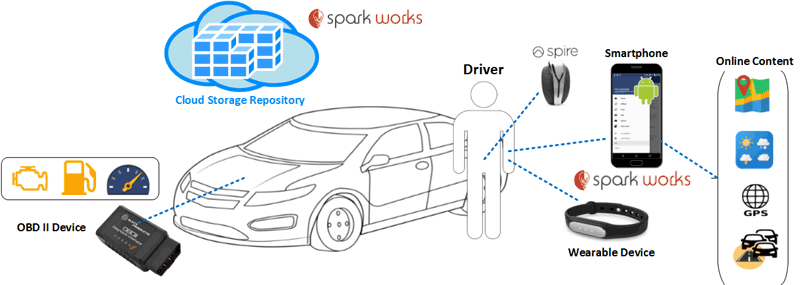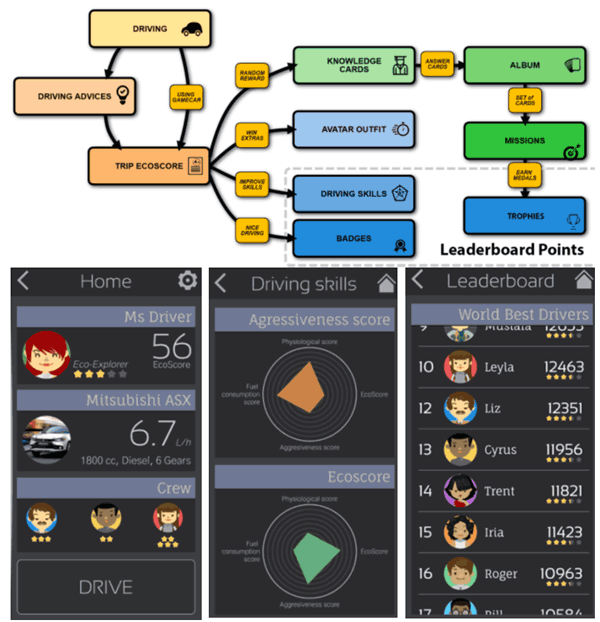by Aris S. Lalos (University of Patras and ISI ATHENA), Stavros Nousias and Konstantinos Moustakas (University of Patras)
GamECAR is a Euroean project that aims to teach drivers to adopt an eco-friendly driving style through a serious games platform.
Road transport is one of the major causes of the environmental pollution. According to a recent study it is responsible for about 30% on the total emissions of CO2 into the atmosphere [1]. Among the actions individuals can take to reduce their green-house gases associated with personal transportation, there is to operate their current vehicles more efficiently [2], [3]. Recent studies have shown that in certain situations the driver's driving style can result in differences in terms of fuel consumption (and therefore CO2 emissions) from 2 up to 35% between a calm driver and an aggressive one. At this point, it should be also mentioned that numerous studies have underlined the substantial ecological, economic but, also, road safety adverse benefits that can be derived from adopting eco-driving behaviors.
GamECAR aims to develop a highly innovative and interactive Serious Games platform that will empower and guide users to adopt an eco-friendly driving style. This will be achieved, without distracting users from safe driving, through a multidisciplinary approach aiming at the development of a user friendly, unobtrusive multi-player gaming environment, where the users will not only play collaboratively/competitively using their mobile device but also using the car itself and their own bodies, thus turning eco-driving into an immersive and highly motivating experience.
GamECAR platform is partially based on the design and deployment of a sensing prototype, presented in Figure 1, which unobtrusively records physiological, behavioural, environmental and vehicle parameters combined with online and offline data analysis tools that have been developed for the analysis of multi-parametric data, towards the fuel consumption and Eco-Score calculation while links between rewarding gamification elements and the user’s driving performance have been also established. A Decision Support System (DSS) has been developed for communicating and presenting eco suggestions to a driver in a tailored, contextualized, timely and safe manner. The aforementioned components have been integrated in an interactive gamified application that have been designed using several game-related design guidelines/ elements as means to encourage eco-driving behaviours, presented in Figure 2.

Figure 1: GamECAR data retrieval and processing platform designed by SPARK WORKS.

Figure 2: GamECAR gamification design and Integrated Application created by project consortium.
Automotive research and academic organizations with outstanding track records in shaping the future of the Eco-Driving Training (French Institute of Science and Technology for Transport, Development and Networks, Automotive Technology Centre of Galicia and Institute for Transport Studies in Leeds), have joined efforts with experienced researchers demonstrating scientific excellence during the latest years in their respective fields (e.g. AR/VR enabled applications, User Modelling, Data analytics & Decision Support Systems) (University of Patras), a leading company on developing virtual set solutions and Serious Games in education and health domains (Brainstorm Multimedia), a leading company in delivering advanced hardware and software products in the area of smart devices, building automation and ambient intelligence (SPARK WORKS) and a company with significant expertise on designing, commercializing and implementing technological solutions in domains with advanced automation and safety critical human machine interfaces (KITE Solutions SRL)—see entire project consortium, to implement GamECAR project [L1], with a duration of two years (started on 1st of January, 2017) and funded under Horizon 2020 funding instrument of the European Union. GamECAR project target to deliver s unique personalized system, designed to motivate the adoption of an ecofriendly driving style, without distracting users from safe driving. To achieve its scope, the project has developed and integrated various technologies, including:
- Fuel consumption modeling for Eco-Driving assistance systems;
- A wireless personal network of sensors to continuously monitor physiological, environmental and behavioral parameters;
- Machine learning methods to model and predict driving behaviors;
- Decision support system to provide efficient personalized guidance for the self-management of “eco-driving”.
These innovative elements were welcomed by the automotive and the ICT scientific community with extremely positive feedback. This indicates that the project has great potential and the consortium is going in the right direction. In September 2018, the GamECAR system will start to be tested in three different sites in France, UK and Spain, to determine whether it provides the eco-driving benefits to different end users. This is the final step towards a validation and the eventual availability of the GamECAR system to the mass market and other potential end users including professional and non-professional drivers, auto-insurance companies, driving schools, commercial fleet companies, e.t.c.
Link:
[L1] www.gamecar.eu
References:
[1] G. Santos: “Road transport and co2 emissions: What are the challenges?”, Transport Policy 59 (2017), pp. 71-74.
[2] C. Magana, M. Munoz-Organero: “GAFU: Using a Gamification Tool to Save Fuel”, in IEEE Intelligent Transportation Systems Magazine, vol. 7, no. 2, pp. 58-70, Summer 2015.
[3] E. Lauper, et al.: “Psychological predictors of eco-driving: A longitudinal study." Transportation research part F: traffic psychology and behaviour 33 (2015): 27-37.
Please contact:
Aris S. Lalos
University of Patras, and ISI ATHENA, Greece











